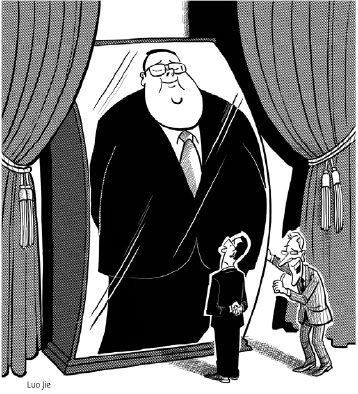Opinion
Be warned against songs of the Sirens
By Wang Yusheng (China Daily)
Updated: 2010-02-03 07:49
 |
Large Medium Small |

China's unprecedented economic development made the world sit up long ago. So the spectacular success of the 2008 Beijing Olympic Games and China's swift and effective response to the global economic crisis could only enhance its image in the international community further.
China today cannot be kept away from most of the international issues. And the sense of pride and joy Chinese people derive from the fact can be a driving force for the country to advance into the future. These are facts.
Though praises have been heaped on China from many corners of the world, it has its share of detractors, especially in the industrialized world - a few of who try to lure it into a trap with "songs of the Sirens". Some of the detractors sing songs like "Chinamerica", "G2" or the co-leadership of the world to entice China. Others have, what they consider, two trump cards up their sleeves to beat it with: China's foreign exchange reserves, which incidentally is the largest in the world, and its still fast growing GDP - both, ironically, considered China's strong points.
They assert that the US has to share power with China on the global stage, or even make concessions for it because it is its largest creditor. China's GDP has surpassed Germany's, and is likely to overtake Japan this year. Many even contend that China could become the largest economy, surpassing the US, in a few decades, and claim that Beijing's rise will transform it into an expansionist power pursuing hegemony, just like the US.

These Sirens' songs are intended to drive Chinese sailors crazy so that their vessel hits a rocky coast and they are shipwrecked. Chinese people have to plug their ears against these songs no matter how enticing and fascinating they may sound before they numb their senses and compel them to commit mistakes. They can, of course, feel proud of China's foreign reserves because they indicate the country's growing power and status. But they must realize it is folly to compare it with those of the developed economies.
For example, in the US, Japan and European Union countries, a majority of the foreign exchanges is held by the people. In the US, non-governmental foreign reserves amount to $9 trillion, almost 60 times as much as China's. America's gold reserve is 8,135 tons, nearly 14 times that of China's 600 tons. And though the Japanese government's holdings are smaller than China's, its private sector has $3 trillion in foreign reserves, almost 20 times that of China. Japan has no foreign debt, and many countries, including China, owe it more than $300 billion.
Besides, China's huge stock of US Treasury bonds is a "double-edged sword". It is true it can influence the US by using its reserves. But it also true the US has partly "hijacked" its economy.
China's rapidly growing GDP is no reason for complacency, either. Though China is likely to become the world's second largest economy this year, its per capita GDP is only one-tenth of Japan's and one-fourteenth of the US - in fact, it's not even among the world's top 100. Moreover, America's output accounts for a quarter of the world's total, whereas China's, less than 10 percent.
The GDP is not the only economic benchmark, though. A large share of China's output is made up of foreign capital. China's Gini coefficient, a measure of inequality of wealth, is third in the world, making the gap larger than even India's. It is a shame that China's luxury consumption is second in the world when 30 million people in country still live below the poverty line, that is, earn less than $1.25 a day.
But it is an even greater shame that many Chinese mainstream media and scholars are enticed by the modern-day Sirens' songs. Let alone plugging their ears to their songs, some even sing along with them. Wittingly or otherwise, they repeat with the Sirens that "the US-China era will come soon", the seeds of "a multi-polar world, led by two super powers" have already sprouted, and "China's status is close to that of developed countries". They claim China is second only to the US in military power. They contend that instead of keeping a low profile, China should compete openly with the developed countries. Some even beat the drum of "China's leadership in the world".
Since China enjoys an enhanced reputation worldwide it should definitely be more active on the international stage. But its engagement should conform to domestic and global conditions. The most important act on the global stage is to use the "soft power" of Chinese diplomacy to establish a peaceful, cooperative and harmonious region and world, and to advocate democracy and diversity on the international stage.
First, such actions could stir impetuosity, something that has existed in China, and could cause trouble and hamper the country's economic development.
Second, it could force China's friends into believing, falsely though, that it has hidden aspirations. Many developing countries may misunderstand China's intentions and think it is out to hatch an international conspiracy with the US to "rule" the world together.
Third, it could lend a wonderful excuse to the West, especially the neo-conservative schemers in the US, to load excessive burden on China.
Fourth, the developed countries and China's neighbors may become unnecessarily wary, even fearful, of Beijing, giving the West more fanciful wings to fly their "China threat" theory on.
China cannot afford to fall prey to the songs of the modern-day Sirens. If Chinese people indeed want to sing, let them sing songs of reality not illusion, songs of heroism not frivolity, songs of reason not impetuosity. They should not be unduly excited. Instead, they should sing in harmony songs like the Beijing Olympics' You and Me.
The author is a Beijing-based researcher on international studies and former Chinese diplomat













